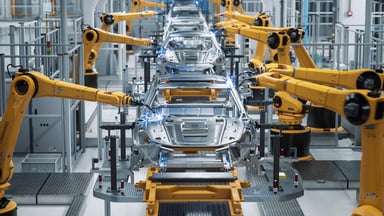Artificial Intelligence (AI) has revolutionized various industries, and manufacturing is no exception.
With its ability to analyze vast amounts of data and automate complex processes, AI is transforming the manufacturing landscape. Backdropped by the increasing global demand for goods and services, this has led to a projected investment of $16.7 billion in AI systems for manufacturing by 2026. This reflects the potential value and growth opportunities that AI offers to the manufacturing industry.
However, with any technological advancement, there are both pros and cons to consider in how artificial intelligence impact manufacturing.
In this article, we will delve into the pros and cons of integrating artificial intelligence into your manufacturing production process.
The Pros of Artificial Intelligence in Manufacturing
AI offers many opportunities for improvement and advancement in manufacturing.
Here are a few of the advantages of the impact of AI in manufacturing:
- Increased efficiency
61 percent of industrial manufacturing business leaders say that an increase in productivity is the greatest potential benefit of AI adoption and most (95 percent) agree that AI technology would make their company run more efficiently.
AI algorithms analyze data, identify patterns, and optimize manufacturing processes in real-time, resulting in faster production cycles, lower costs, and higher profits.
AI’s efficiency and accuracy help manufacturers reduce repetitive tasks, like double-checking calculations and data input. By automating these processes, manufacturers save time and can focus on core aspects of production.
- Predictive maintenance
AI technology helps predict when machines need maintenance. It uses vast amounts of data from sensors, equipment to identify potential problems and schedule maintenance before things break.
This proactive approach reduces downtime, saves money on repairs, and makes machines last longer.
For instance, Volvo uses AI to analyze millions of events each week, like temperature changes or unusual pressure readings, to see how they affect machine performance. This helps them prevent costly breakdowns.
- Enhanced product quality
Fiat Chrysler China “trained an AI system to detect improper assemblies or missing components, such as small screws that are hard to detect for a human eye. The system is extremely fast and efficient, allowing defective parts to be taken off the main conveyor on a separate line to the rework area where they can be corrected...”
This kind of real-time analysis and defect detection helps manufacturers ensure quality control, reduce scrap costs, and improve customer satisfaction.
- Supply chain optimization
Did you know businesses squander an astonishing 6,500 hours annually on tedious manual procedures linked to the management of the supply chain?
AI can enhance supply chain management by eliminating inefficiencies and handling repetitive tasks. With access to data analytics, AI can help transform the manufacturing processes, optimize stock levels, and enable lightning-fast adaptations within moments.
Danone Group, a multinational food manufacturer, used AI and machine learning algorithms to improve their demand forecasting accuracy, resulting in significant improvements in forecasting and planning. The result? Optimized supply chain, decrease in forecast errors by 20%, and reduced workload for demand planners by 50%.
The Cons of Artificial Intelligence in Manufacturing
 Although AI offers many benefits to the manufacturing sector, there are some potential drawbacks that manufacturers should consider before implementing it in their operations.
Although AI offers many benefits to the manufacturing sector, there are some potential drawbacks that manufacturers should consider before implementing it in their operations.
Here are a few of disadvantages of AI:
1. Workforce displacement
According to a National Association of Manufacturers survey, 33% of manufacturers reported reducing their labor costs through AI and other technologies.
Smart factories can train industrial robots to assemble parts efficiently and accurately. Also, these robots do complex tasks resulting in a decrease in the demand for human labor.
Consequently, there may be a reduction in employment opportunities, particularly for dedicated employees who lack sufficient technical training and experience.
- High implementation costs
The cost of implementing AI into a manufacturing environment can be quite high. Manufacturers need to invest in expensive hardware and software, as well as specialized personnel, to operate the AI-powered systems.
Plus, there are also training costs associated with teaching employees how to use new and connected machines. The potential savings in labor costs may not outweigh the initial outlay for many companies.
Hence, it’s important for manufacturers to conduct a careful cost-benefit analysis before investing in an AI system.
- Data security and privacy concerns
AI systems rely on big data to operate effectively. It may include sensitive information about customers, production processes, and supply chain details.
Smart factories must ensure that robust cybersecurity measures are in place to protect this data from unauthorized access, hacking, or other security breaches.
Also, privacy concerns arise when sharing or collaborating on data with external partners or suppliers.
- Over-reliance on AI
Smart manufacturing systems can improve manufacturing operation, but companies must still be careful not to rely too heavily on them.
AI systems can fail because of a variety of reasons, like power outages or hardware malfunctions. It is essential for companies to maintain a backup plan that can kick in when a system failure happens.
Also, it is important to remember that AI can only provide insights and advice, but the key decision should always have human intelligence input.
Artificial Intelligence in Manufacturing
Using artificial intelligence in manufacturing can lead to significant improvements in efficiency, accuracy, and cost savings. However, manufacturers should be aware not just of the benefits of AI but also of the potential drawbacks before adopting AI and implementing it into their production facilities.
By weighing these factors and taking appropriate measures to address them, companies can make sure that they can reap the full benefits of artificial intelligence.
To learn more about how Radwell can assist your manufacturing operation

